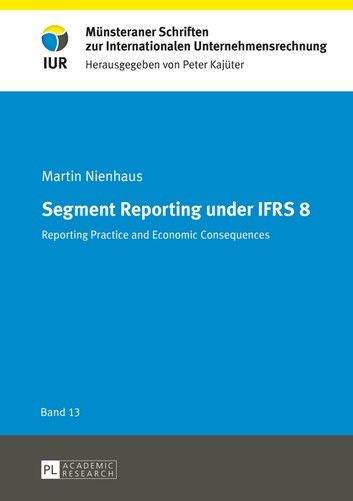| FindBook |
有 1 項符合
Segment Reporting under IFRS 8的圖書 |
 |
Segment Reporting under IFRS 8 作者:Martin Nienhaus,Peter Kajüter 出版社:Peter Lang GmbH, Internationaler Verlag der Wissenschaften 出版日期:2015-07-24 語言:英文 |
| 圖書館借閱 |
| 國家圖書館 | 全國圖書書目資訊網 | 國立公共資訊圖書館 | 電子書服務平台 | MetaCat 跨館整合查詢 |
| 臺北市立圖書館 | 新北市立圖書館 | 基隆市公共圖書館 | 桃園市立圖書館 | 新竹縣公共圖書館 |
| 苗栗縣立圖書館 | 臺中市立圖書館 | 彰化縣公共圖書館 | 南投縣文化局 | 雲林縣公共圖書館 |
| 嘉義縣圖書館 | 臺南市立圖書館 | 高雄市立圖書館 | 屏東縣公共圖書館 | 宜蘭縣公共圖書館 |
| 花蓮縣文化局 | 臺東縣文化處 |
|
|
圖書介紹 - 資料來源:樂天KOBO 評分:
圖書名稱:Segment Reporting under IFRS 8
The adoption of IFRS 8 marked a major change in the segment reporting rules under IFRS. This step, however, was heavily criticized and several questions regarding IFRS 8 still remain unanswered. Therefore, this study analyzes the impact of IFRS 8 on segment reporting practice and its economic consequences. The results show that firms report on average more segment information. Moreover, segment reports from the management’s perspective are useful and mitigate information asymmetries, reduce the cost of capital and affect the work of financial analysts. The findings have implications for the IASB, preparers, auditors and users of financial statements as well as enforcement institutions.
|











